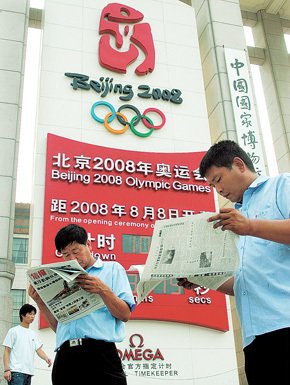 |
|
Beijing citizens reading newspapers.
|
Neighborhoods razed, expectations high, but where will the wealth go?
"Where only months ago there was an old house now stands a high-rise apartment, and once-narrow alleys have been widened into streets." So said Mr. Cheong, a Korean citizen who commutes between China and his homeland. "I have never in my life seen such a cataclysmic change." The Chinese government concluded that their loss in the bid for the 2000 Olympics stemmed from severe pollution, chronic traffic congestion, and the deficiency of their citizens' "Olympic spirit." Thus, the Chinese government drew up a blueprint to fix these problems as part of its bid for the 2008 Olympics, and having been picked, is carrying out the plans without delay. Due to the nature of China's development-oriented government and its rigid hold on power, China is suffering from the fatigue of a second "Great Leap Forward." To achieve success, the Beijing metropolitan authorities are investing 100 billion yuan (US$12.8 billion) into cleansing the air. All buses and taxis are to be upgraded and the use of anthracite briquettes for heating will be outlawed within city bounds. Old "unsightly" apartment complexes are to be rebuilt, and 44 hectares of marble is to be laid in Tiananmen Square. There is also an all-out effort underway to "augment [Chinese] civilization," as the government is spinning it. A significant sum of money has been invested in a three-stage campaign to teach manners to "1 million households," and posters exhorting people to act like "Olympic citizens" have been displayed prominently. Chinese people are being taught to be ashamed of habits disagreeable to foreigners.The 2010 Shanghai Expo is also the subject of great expectations among many Chinese. Though it is still four years away, many expect resulting prosperity. From May to October of 2010, some 25 billion yuan will be invested to convert the hundred-year-old dockyards along the Huangpu River into fairgrounds for the Expo. Furthermore, 277 kilometers of new subway lines will be constructed, such that the Shanghai subway's scale will not fall short of those in New York and Paris. "A windfall of at least 1.6 billion yuan is expected through the opening ceremonies of the Olympics," said a Communist Party official. "What's more, some 2 million new jobs will be created, and thus the vexing problem of unemployment will be partially resolved. It will also be an opportunity to simultaneously help the food and lodging industries if displays and expositions continue in the long term. This in turn could benefit the consumer market." Listening to the words of the official, it is clear that the Olympics and Shanghai Expo are regarded as a cure to many of the ills from which modern China suffers. However, the shadows of this enthusiasm are dark, indeed. According to one youth selling flowers from his bicycle, "everyone's becoming ecstatic, but I'm uneasy, thinking of how everything is being turned upside down. I cannot sleep even just thinking of the wealth disparity that will result from the Olympics and the Expo." Selling illegal DVDs on the street, a young man next to the flower salesman pitched in. "Whether it's the Olympics or the Expo, it only concerns people who already hold wealth." Please direct questions or comments to [englishhani@hani.co.kr]





